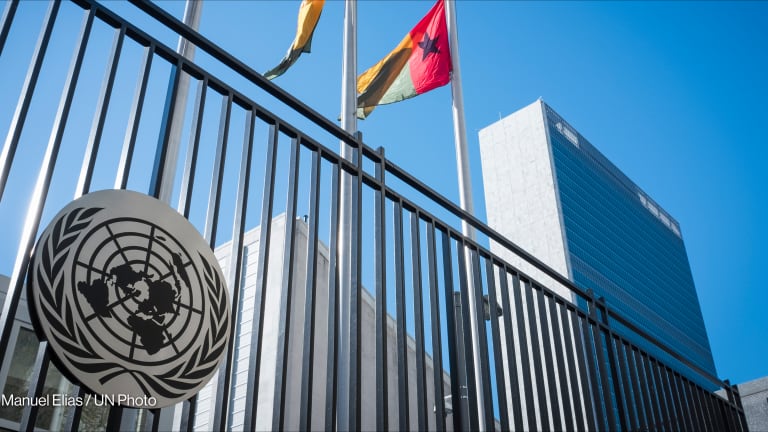
Hello, U.N. nerds.
Over the coming week, the United Nations will host not one but two world leader meetings — the Summit of the Future, which seeks to chart the future of international cooperation, and the annual high-level U.N. General Assembly, the largest gathering of world leaders anywhere on Earth.
In our special newsletter, I will help you navigate the diplomatic chaos that clogs traffic in Midtown Manhattan and overloads the senses of any serious observers, starting with a big-picture take on the stakes during this year’s session and a list of the key players to watch, from microfinance pioneer and head of Bangladesh’s interim government Muhammad Yunus to Africa’s youngest democratically elected president Bassirou Diomaye Diakhar Faye of Senegal.
If you’re not a Devex Pro member yet, consider joining the club! A Pro membership helps sustain the journalism we’re able to bring you. Try it for free for 15 days.
Read:
• UN Future Summit seeks to unite a fractured world
• Who's who at the UN Future Summit
• How to survive UNGA (Pro)
Fix this damn thing
This week’s annual U.N. world leader summit is supposed to be about the future. But it is being weighed down by problems and divisions of the present. The multilateral system — from the U.N. to the Bretton Woods financial and development institutions — that was built to hold the world together after two World Wars is in deep crisis and needs major reform. Poverty is up, the climate crisis is worsening, indebtedness is crippling lower- and middle-income countries, and the Sustainable Development Goals are a pipedream. Meanwhile, a paralyzed U.N. Security Council has struggled to halt conflicts from Gaza to Sudan and Ukraine.
Brinkmanship or bust
On Thursday evening Russia, Pakistan, and a coalition of mostly autocratic governments blocked agreement on the U.N.’s Pact of the Future, throwing international negotiations on the most important U.N. reform initiative in a generation into chaos. It remained unclear whether the spoilers were engaging in a game of high-stakes brinkmanship to exact concessions in the final days or whether they were prepared to torpedo an agreement that enjoys the backing of 175 U.N. member states.
In a letter to the lead negotiators, Russia objected to more than 25 provisions in the draft future pact, including urging states to abide by international law and resolve disputes without engaging in “threats or use of force, acts of aggression,” and calling for restraints on the use of nuclear weapons and the application of artificial intelligence in conflict. Moscow also joined forces with Belarus, Eritrea, Iran, Nicaragua, Syria, and Venezuela in opposing language that protects human rights, promotes gender equality, and deepens the U.N.’s partnerships with civil society.
The texts under consideration, Russia’s U.N. Ambassador Vassily Nebenzia wrote Thursday in the letter, “still contain elements that are unacceptable.”
Pakistan — writing on behalf of the so-called Like-Minded Group, a coalition of mostly autocratic countries, including Cuba, China, Eritrea, Russia, Syria, and Venezuela — also objected to five provisions in the pact, including one that would consider efforts to strengthen the U.N.’s role in responding to global shocks, from climate catastrophes to pandemics. Saudi Arabia also objected to a provision on the dangers posed by fossil fuels, according to two diplomatic sources.
Legacy at risk
The Future Summit provides U.N. Secretary-General António Guterres with his best last attempt to reform multilateralism and build an enduring legacy, as the coming years mark the search for a new U.N. leader. The high-level Summit of the Future kicks off Friday, with two “action days” of U.N. meetings and events promoting youth and civil society. World leaders take the stage on Sunday and Monday, opening the event with a series of declarations, including a Pact of the Future, which charts the next 25 years for the U.N.; a Global Digital Compact that sets new guardrails on the digital world; and a Declaration on Future Generations to boost the role of the young in national and international decision-making. Russia and its cohorts also raised objections to several provisions in the drafts of those two documents.
Here’s a schedule of the two-day summit.
Bye-bye Biden
U.S. President Joe Biden is slated to deliver his final, farewell address to the General Assembly on Tuesday morning, after somewhat grudgingly passing the torch to his vice president, Kamala Harris. Harris is not scheduled to appear in New York, but may meet with world leaders in Washington, D.C.
Big power snub
Guterres had hoped the Future Summit would draw world leaders from around the globe. But the leaders of U.N.’s most powerful, veto-wielding countries — China, France, Russia, the United Kingdom, and the United States — declined the invitation, raising concerns about their commitment to the U.N. secretary-general’s legacy-making reform. U.S. Secretary of State Antony Blinken will address the gathering, along with ministers from France, Russia, and the U.K. China will be represented by its deputy prime minister.
Butting heads with Blinken
The Biden administration has faced resistance from China and Russia in its effort to replace a Kenyan-led police mission fighting Haitian gangs with a U.N. peacekeeping force. On Wednesday, Beijing and Moscow blocked the latest U.S. draft resolution for the transition. The U.S., currently funding the Kenyan mission, hopes a U.N. mandate would spread the financial burden a little wider. However, Guterres has opposed the idea. “Peacekeeping means to keep the peace, and that's not exactly the situation we have in Haiti,” he told Reuters. “The Americans’ noses are out of joint over all that,” one U.N. insider said. “And the Russians and Chinese are using the statement from the secretary-general in the negotiations.”
Elephant in the room
Lurking beneath the surface in talks on multilateral system reform are deeper concerns about the U.S. political system’s stability. “There is a big elephant in the room, which is the United States,” said Martin Kimani, executive director of the Center on International Cooperation at New York University. “The United States has had two assassination attacks against a major presidential candidate and ex-president.” The very fate of the multilateralism system — established by the U.S. after World War II — depends on U.S. political stability, he noted. The Jan. 6 siege of the U.S. Congress and the current political polarization is bringing that into question. “There will be a lot of curiosity about the implications of a Trump win, what are the implications of a Kamala win on the Paris Agreement, on the World Health Organization, for the different visions they have for the U.N.”
Year of living dangerously
U.N. workers saw the greatest loss of life over the year. In Gaza, at least 220 staff with UNRWA, the lead U.N. agency helping Palestinians, alone have been killed since the war began, according to Philippe Lazzarini, agency’s commissioner general.
Unlawful presence
On Wednesday, the U.N. General Assembly overwhelmingly adopted a nonbinding resolution demanding Israel abide by a recent International Court of Justice ruling that it end its “unlawful presence” in Gaza and other occupied Palestinian lands, and end its expansion of Israeli settlements on Palestinian lands.
And now, Lebanon
Israel reportedly planted and ignited explosives in pagers and walkie-talkies held by Hezbollah members, leading to at least 32 deaths, including at least two children, and thousands injured. On Wednesday, U.N. High Commissioner for Human Rights Volker Türk denounced the attack and called for an investigation. Türk didn’t name Israel, but several U.S. intelligence officials said that Israel was behind it, according to The New York Times.
Arab League
The Slovenian presidency scheduled an informal meeting with the Arab League to discuss advancing peace efforts, shoring up the beleaguered UNRWA, and preventing “igniting a broader regional conflagration” across the Middle East, according to an internal concept note. They will also discuss a possible peace conference to end the Israeli-Hamas war, including what role Guterres will play. The U.S., Egypt, and Qatar, meanwhile, have struggled to get Hamas and Israel to agree to a cease-fire and release all Israeli hostages held by the terrorist group.
Blinken’s Sudan push
Eclipsed by Gaza and Ukraine, Sudan has forced itself onto the agenda. The U.N. reports that over 7.4 million people have been forced from their homes, with an additional 3.8 million internally displaced from previous conflicts, making it “the single largest humanitarian crisis on the planet,” according to USAID Administrator Samantha Power. Blinken will host a meeting of foreign ministers Wednesday to draw attention to the crisis.
The future can’t wait
At Devex, we will host discussions at our The future can’t wait: Shaping tomorrow, today conference, happening from Sept. 25 to 26. I will moderate conversations on the Future Summit with Michéle Griffin; discuss food as a weapon of war with a terrific panel, including writer Alex de Waal and Refugees International President Jeremy Konyndyk; and a chat about the Global Digital Compact with Chatham House’s Renata Dwan. If you haven’t yet, sign up to join Devex @ UNGA 79. The event is free.
For a list of other events taking place during UNGA 2024, check out this page.
Celebrity sightings
The high-level week has long drawn corporate bigwigs, entertainment celebrities, and philanthropists to advocate pet causes. This week is no different. Matt Damon, actor and co-founder of Water.org and WaterEquity; Prince Harry, the Duke of Sussex; U.S. first lady Jill Biden; and screenwriter and producer Shonda Rhimes will be among the familiar faces at the Clinton Global Initiative. Basketball star Joel Embiid and philanthropist Bill Gates will attend an event hosted by SEMAFOR. At the Devex conference, we will talk to America Ferrera, actor and goodwill ambassador at the International Organization for Migration, and Amy Pope, director general of the IOM.
100 days detained
Sept. 18 marked the 100th day since Yemen’s Houthi rebels mass arrested more than 50 local relief workers, including 13 U.N. employees, and staffers from foreign embassies and private businesses. Another four U.N. workers have been detained since 2001 and 2003. USAID’s Samantha Power and U.K. Development Minister Anneliese Dodds will co-host an event on U.N. detainees in Yemen that will be attended by the Yemeni foreign minister and is part of a wider effort to draw attention to the plight of the detainees.
Health checkup
Since the COVID-19 pandemic, health has become an increasingly important topic in U.N. debates. Last year, the U.N. organized three high-level summits on health. This year, there will be a summit on antimicrobial resistance, or AMR. In Africa, deaths from antimicrobial resistance are already surpassing those from malaria, HIV, and tuberculosis. By 2050, as the African population is expected to double, AMR-associated deaths could rise to 4.1 million annually.
By the numbers
41,000 — that's how many Palestinians were killed in Israel’s nearly yearlong Gaza offensive.
$2.44 trillion — that’s how much the global military expenditures for 2023 are. While international development funding has sagged, spending on arms has increased for nine straight years.
14.5 million — that is the estimated climate change deaths globally by 2050, according to the World Economic Forum.
8 million — that’s the estimated number of people the climate crisis could push to migrate to 10 global south cities by 2050.
Sign up to Newswire for an inside look at the biggest stories in global development.








